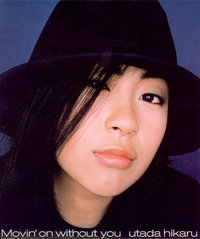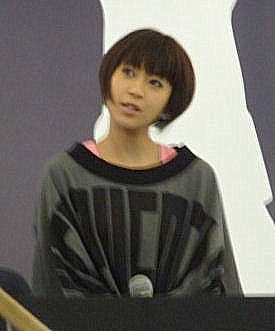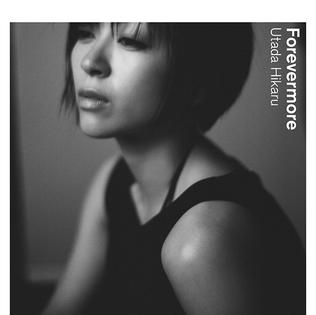
Hikaru Utada, who is also known by the mononym Utada, is a Japanese-American pop singer, songwriter and producer. Utada has become one of the most influential and best-selling musical artists in Japan.

"Movin' On Without You" is a song recorded by Japanese–American singer and producer Hikaru Utada taken from their debut studio album First Love (1999). The song was written, arranged, and produced by Utada themselves, and it became their first ever hit. "Movin' On Without You" was written, produced and composed while Utada was attending college in Tokyo, Japan, during 1997. Utada, who received a record contract by Toshiba-EMI, had written an English-language version of the song, but the song remains unreleased.

The discography of Japanese-American R&B and pop singer Hikaru Utada consists of eleven studio albums, three compilation albums, eleven video albums and numerous singles and promotional singles. Utada began as a musician in the early 1990s as a member of U3, a family unit made up of her, her mother Junko Utada, also known as 1970s enka singer Keiko Fuji, and her father, musical producer Teruzane Utada. U3 released their debut album Star in 1993, with the hope to debut in America. In 1996, the group was rebranded as Cubic U, an R&B project focusing on Hikaru Utada, resulting in the English language album Precious in 1998 with record label Toshiba EMI.

"Kiss & Cry" is a song recorded by Japanese American recording artist Hikaru Utada for their seventh studio and fifth Japanese album, Heart Station (2007). It was written, composed, and arranged by Utada, whilst production was handled by Utada, their father Teruzane Utada, and Akira Miyake. The single premiered on May 31, 2007 as the third single from the album in Japan. It was re-released as a double A-side single with "Beautiful World", which also appeared on the parent album on August 29 in Japan, and digitally worldwide. Musically, "Kiss & Cry" is an R&B song, influenced by pop and hip-hop music. Lyrically, it discusses both Utada's upbringing and social beliefs between both Western and oriental regions.

Heart Station is the seventh studio and fifth Japanese-language album by Japanese–American recording artist Hikaru Utada. It was released on March 19, 2008 by EMI Music in Japan, and globally on March 26, 2008. It is Utada's eighth consecutive studio album to be fully written and produced by her, with the help of her father Teruzane Utada and long-time collaborator Miyake Akira through the production. Recorded between 2006 and 2008, it was worked on whilst she was recording her ninth studio and second English-language studio album, This Is the One (2009). With the album artwork photographed by Japanese photographer Mitsuo, Heart Station was released in two formats: a physical CD, and as a digital download.

"Heart Station" is a song by Japanese musician Hikaru Utada, which was released as a double A-side single alongside her song "Stay Gold" on February 20, 2008. The title track for her album Heart Station, the song was heavily promoted on radio stations, for three weeks it was the number one song on the newly established Billboard Hot Top Airplay chart, despite only managing to reach number two on the Billboard Japan Hot 100.

"Come Back to Me" is a pop and R&B song by Japanese American pop singer Hikaru Utada, released under the mononymous moniker Utada. The song was written by Utada and Stargate and was produced by Utada, Stargate and her father, Sking U. "Come Back to Me" is the first single from her second English-language album This Is the One. In the United States, the song has peaked at number five on the Billboard Hot Dance Club Play and number 69 on the Pop 100 chart.
Jasmine, is a Japanese singer and songwriter from Tokyo. She is represented by Sony Music Japan, and is a DJ for the Japanese radio station J-Wave. In June 2009 she released her debut single "Sad to Say". Described as "the next Hikaru Utada", Jasmine cites Utada as her influence.

Utada Hikaru Single Collection Vol. 2 is Japanese pop singer-songwriter Hikaru Utada's second compilation album, released on November 24, 2010, by EMI Music Japan, the same day as her Universal-released English language compilation album, Utada the Best. The album includes two discs, with the first being a 13-track greatest hits album spanning 2004–2009, while the second is an extended play featuring new material. Along with Utada the Best, this remained Utada's last album release for six years, until 2016's Fantôme, due to an announced hiatus. Several of the new songs achieved commercial success, with "Goodbye Happiness" reaching number one on Billboard's Japan Hot 100 chart, and "Can't Wait 'Til Christmas" reaching number one on the Recording Industry Association of Japan's digital track chart. Both songs have been certified by the association as gold records for full-length cellphone downloads.

"Hanataba o Kimi ni" is a song by Japanese singer-songwriter Hikaru Utada. It was released digitally on April 15 2016, alongside "Manatsu no Tōriame" as joint singles for her album Fantôme. The song was the theme to the dorama Toto Neechan. The single is Utada's first release since 2012's Evangelion: 3.0 theme song "Sakura Nagashi", and marks her official comeback to the Japanese music scene.

Fantôme is the sixth Japanese studio album by Japanese-American singer-songwriter Hikaru Utada. Although Utada announced an indefinite hiatus from the public eye in August 2010, she continued writing and composing material with her father, Utada Teruzane, and long-term collaborator, Miyake Akira. Musically, Fantôme contains a collection of tracks that utilizes acoustic and stripped-down instrumentations, alongside influences of pop, electronic, and R&B music. The lyrical content delves into themes of grief, sadness, love, and death—mostly influenced by the death of her mother, her second marriage, and the birth of her son in 2015.
"Nijikan Dake no Bakansu" is a song by Japanese singer-songwriter Hikaru Utada, featuring guest vocals by Sheena Ringo. A corresponding music video was released on September 16, 2016, and the song was sent to radio stations as well, to promote the release of the album Fantôme.

"Forevermore" is a song by Japanese American singer-songwriter Hikaru Utada. It is their second single under the label Epic Records, from their upcoming seventh Japanese-language studio album, Hatsukoi. The song was used as a tie-in for TBS dorama Gomen, Aishiteru, their first single used in a drama of a commercial TV station since "Eternally " in 2008. It features the renowned drummer Chris Dave.

"Anata" is a song by Japanese-American singer-songwriter Hikaru Utada. It is their third single under the label Epic Records Japan, from their seventh Japanese-language studio album Hatsukoi. The song was used as a tie-in for movie Destiny: The Tale of Kamakura, and was released as a digital download on December 8. The song is their first movie tie-in in 5 years, since "Sakura Nagashi" was released in 2012 for Evangelion: 3.0 You Can (Not) Redo. The song was written with a Buddhist's view to show both the real and fantasy mixed world shown in the movie. Besides the movie, the song is also featured in a Sony campaign to promote a wireless headphone line, in which they themself also appears.
"Chikai" is a song by Japanese American singer-songwriter Hikaru Utada. Along with its English-language counterpart "Don't Think Twice", it serves as the ending theme song to the Square Enix video game, Kingdom Hearts III. "Chikai" first appeared on Utada's seventh Japanese-language studio album, Hatsukoi, and was also included on the setlist of their Laughter In The Dark Tour.

"Hatsukoi" is a song by Japanese-American singer-songwriter Hikaru Utada. It is her fifth single under the label Epic Records Japan and was taken from her upcoming seventh Japanese-language studio album Hatsukoi. The song was released as a digital download on May 30 and was used as a tie-in for the Japanese television drama Hana Nochi Hare - Hanadan Next Season. It's the second song that Utada delivers to the series, after Flavor of Life in 2007.

Hatsukoi is the seventh Japanese-language studio album by Japanese–American recording artist Hikaru Utada. It was released on June 27, 2018, as her first album under Sony Music Japan sublabel Epic Records Japan. The release coincided with the commemoration of her 20th Anniversary as an artist in Japan. A national tour was announced to support the album in November 2018. The five previously released songs were confirmed in the album track list, for a total of twelve songs, including the title track "Hatsukoi" and the Kingdom Hearts III theme song "Chikai".

"Face My Fears" is a song by Japanese-American singer-songwriter Hikaru Utada and American record producer Skrillex, released on January 18, 2019, by Epic Records Japan. Along with its English-language counterpart, it serves as the opening theme song to the Square Enix video game Kingdom Hearts III. It was written as a collaboration between Utada, producer Skrillex, and R&B songwriter Poo Bear.

"Time" is a song by Japanese-American singer-songwriter Hikaru Utada, released on May 8, 2020, by Epic Records Japan. It served as the theme song for the NTV drama Bishoku Tantei Akechi Goro. The song was certified Gold by RIAJ for selling more than 100,000 digital downloads in Japan.

One Last Kiss is an extended play by Japanese musician Hikaru Utada, which was released in the US on March 9, 2021. It was released for promotion of the Japanese animated film Evangelion: 3.0+1.0 Thrice Upon a Time around the time of the film's release. It contains all the previously released theme songs that were made for the Rebuild of Evangelion film series. It also contains the theme song "One Last Kiss", which was co-produced by A. G. Cook and released in conjunction with the film on March 10, 2021.
















